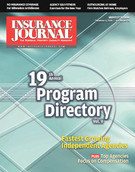Commissions and the MLR
“After hearing from various interested parties, if HHS does not fix this language before the rule is final, we hope that Congress will step in and revise the MLR formula through the legislative process.”
—Charles E. Symington Jr., senior vice president for government affairs for the Independent Insurance Agents & Brokers, after the Obama Administration announced that broker commissions would not be protected in the medical loss ratio that health insurers must adhere to beginning in 2011. The MLR requirement is part of the Patient Protection and Affordable Care Act and requires health insurers to spend 80 percent to 85 percent of consumers’ premiums on direct care for patients. The intention is to limit the share of premiums that insurers spend on administrative costs and profits, including executive salaries, overhead and marketing.
Fatalities Fell, But …
“The experience of the past three years is not grounds for concluding that sustainable progress has been made on traffic safety.”
—A report from a U.S. government research panel that found the United States is lagging behind nearly every other high-income country in reducing annual traffic fatalities. U.S. traffic fatalities fell 9.7 percent in 2009 to 33,808, the lowest number since 1950. In 2008, an estimated 37,423 people died on the highways, a decline of 9.3 percent from the previous year. But dramatic declines in traffic fatalities in the United States over the past several years are likely due to a sour economy in which people drive less, rather than lasting changes in behavior, the report suggested. As the economy improves, researchers said, fatalities are likely to rebound. (AP)
A Mistaken Assumption
“Consumers might mistakenly assume that these beverages are safe because they are widely sold.”
—David Vladeck, director of the Federal Trade Commission’s Bureau of Consumer Protection. U.S. regulators warned makers of caffeinated alcoholic drinks that their products are unsafe and violate federal laws, following a public outcry and several state bans. The U.S. Food and Drug Administration sent warning letters to four firms – Phusion Projects LLC, United Brands Co., New Century Brewing Co. and Charge Beverages – charging that seven of their drinks combining alcohol and caffeine were unsafe. The FTC also warned the manufacturers that their marketing may be deceptive or unfair. Sweetened drinks with high levels of alcohol and caffeine grabbed headlines across the country after hospitalizations were required in several incidents after the drinks were consumed. In many cases, the drinkers were underage. The drinks have already been banned in several states including Washington and Michigan. The alcohol content of one of the most popular drinks is 12 percent, meaning that one 23.5-ounce can is comparable to drinking four or five beers, with caffeine added.
Topics USA
Was this article valuable?
Here are more articles you may enjoy.


 Lawyer for Prominent Texas Law Firm Among Victims ID’d in Maine Plane Crash
Lawyer for Prominent Texas Law Firm Among Victims ID’d in Maine Plane Crash  Insurance Broker Stocks Sink as AI App Sparks Disruption Fears
Insurance Broker Stocks Sink as AI App Sparks Disruption Fears  Zurich Insurance’s Beazley Bid Sets the Stage for More Insurance Deals
Zurich Insurance’s Beazley Bid Sets the Stage for More Insurance Deals  Trump Demands $1 Billion From Harvard as Prolonged Standoff Appears to Deepen
Trump Demands $1 Billion From Harvard as Prolonged Standoff Appears to Deepen 


